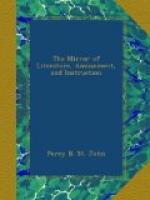every house had a patient or more under this fever,
though these were mistaken for typhus, or at least
thus misnamed. Then it was also about Vauxhall
and Lambeth; and to a great extent among all that
scattered mixture of town and country which follows
from Whitechapel, from Bishopsgate, &c., and very particularly
along Ratcliffe-Highway to an indefinite range along
the river. In Lewisham there were in one house
nine patients under this fever, which proved mortal
to one. We may also enumerate Dulwich, especially
subject to this disorder, Fulham, Ealing, and the
several other villages along the Thames, as far as
Chertsey; and even Richmond, where, as at Lewisham,
there was one house where ten individuals at one time
were suffering under this disease. Whatever was
the pestilence last year, it promises to be much greater
in the present one. This is easily judged from
the manner in which the season has set in, but still
more decidedly from the extraordinary prevalence of
ague in the spring; since that which was intermittent
fever then, will be remittent in the autumn, or rather,
there will scarcely be a definite season of vernal
intermittent, but the remittent will commence immediately,
increasing in extent and severity as the summer advances,
and promising to become, in the autumn, the greatest
season of disease that England has known for this century.
Dr. Macculloch attributes this alarming increase to
malaria, on the production and propagation
of which he has recently published an essay, the leading
argument of which is, “that as the quantity of
the poison which any person can inspire is necessarily
small, and as this small quantity can be produced
by a small marshy spot as well as a large one, it
is the same, as to the production of the disease, whether
the marsh is a foot square or a mile, provided the
exposure be complete; while also any piece of ground
where vegetables decompose under the action of water
is virtually a marsh, or must produce
malaria.”
Acclimatizing Plants.
A Mr. Street, of Biel, in East Lothian, has recently
made some successful attempts at acclimatizing, or
giving to exotic plants greater powers of withstanding
cold than they had when first introduced. By
planting in situations well drained from superfluous
moisture, under circumstances where rapid growth was
rendered impracticable, and in a garden admirably
adapted to the object from its position, he has succeeded
in naturalizing, in latitude 56 deg. N. plants
which have not yet been known to endure the winters
even of the parallel of London.—Quarterly
Journal of Science.
In a table kept at Sydney by Major Goulburn, from
May 1821 to April 1822, the thermometer never rose
above 751/2 deg. and never lower than 54 deg. of Fahrenheit.
Bronzing Tin.
To obtain complete success in bronzing medals of tin,
the two following solutions must be employed:—




